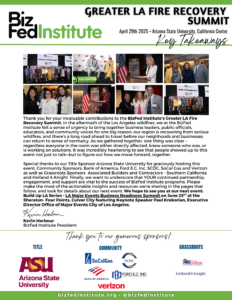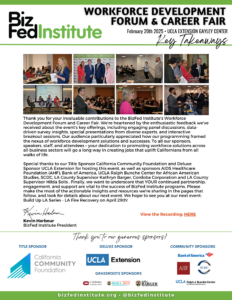Reporting on a successful “Removing Barriers for Minority Business & Homeownership” Forum

Mission of the Forum
To engage, educate and collaborate for inclusionary solutions on the systemic racial issues that impact how public policy have kept minorities from business and home ownership. BizFed Institute and BizFed will convene a panel of business and public policy thought leaders to engage in impactful, insightful, and thought-provoking conversation with the goal being to motivate participants to take the lead in effecting change.
Keynote Speaker
Richard Rothstein – Author, The Color of Law

In The Color of Law (published by Liveright in May 2017), Richard Rothstein argues with exacting precision and fascinating insight how segregation in America—the incessant kind that continues to dog our major cities and has contributed to so much recent social strife—is the byproduct of explicit government policies at the local, state, and federal levels.
Takeaways
- Richard Rothstein’s presentation effectively communicated that every city in America was, and still is segregated by race. This is a tremendous problem for minorities in America because racial segregation and redlining leads to disparities in housing, loans, appraisals, property tax and value, income, health, education, jobs, transportation, utility infrastructure. These combined issues minorities in America face are historical and devastating to their communities and all Americans.
- The government needs to get involved by investing financial resources in solutions that reverse the effects of these historical inequities in all areas and on every level.
- There needs to be a grassroots movements new civil right movement to organize and shape public opinion and policy that makes sure people are aware of the need for this to end immediately.
- Businesses need to play a role by making sure that there is no bias in hiring, promotions, providing loans for aspiring and existing business owners and homeowners, doing business with minority companies, fair insurance premiums, building homes that lower and middle-income levels can afford and more.
Panel Moderator & Keynote Speaker Q&A Moderator
California State Treasurer Fiona Ma

- Acknowledged that there is a historical problem with racial inequity and disparity when it comes to minority business and home ownership.
- We should continue to track the disparities and focus resources found on the State of CA’s website to close the gap and level the playing field.
Panelists
Removing Barriers for Minorities: Frank Robinson, Director, Community Based Programs

Union Bank BizFed and BizFed Institute have made a commitment to eliminate poverty. One of the most prevalent areas for poverty is in the minority communities and business ownership is a tried, tested and true path for elevating out of poverty. This panel engaged in a discussion on what can be done to reverse the effects of unfair lending policies and the bias that contribute to minority population inability to get loans to purchase a business or a home. The goal is for everyone to have a chance at achieving their version of the American Dream.
Break Room Takeaways – Moderator: Schenae Rourk
- Banks are in business to make loans and are always looking for qualified candidates
- Minorities need to form relationships with bankers (in their neighborhoods) to better understand the requirements for securing a loan. People do business with people they know faster than with a stranger.
- Minorities might consider investing in themselves by starting a business as opposed to working a job all your lives. Your children can’t inherit a job but they can inherit a successful business. This is a guaranteed way of creating economic empowerment and generational wealth.
Minority Business Leaders: Reggie Webb, McDonald’s Franchisee

There is an unequal application of business ownership opportunity in America as it applies to communities of color. The most egregious areas of gross infractions involve how access to capital, business licensing and home ownership opportunities. There are minority entrepreneurs who have achieved success and we need to pay attention to their stories and experiences so we can open more doors for others to follow. Reggie Webb did a great job at sharing his story and giving practical advice that can be translated to virtually any business model, whether it’s a startup or an existing business looking to expand.
Breakout Room Takeaways – Moderator: Roozbeh Farahanipour
- Save your money over time and invest in a business that you can afford. Franchises are good but make sure it’s one that has good management and will stand the test of time.
- Know the business inside and out that you want to start. Reggie work their over a number of years and took his stock options to purchase the Franchise.
- PARITY is a critical component to the argument that franchises need to make sure that there is minority representation in ownership when it comes to minority communities.
- Do your homework on how to get a franchise that’s best for you and then how to keep it in terms of best practices
Government Resources & Public Policy: Rex Richardson, Long Beach, CA City Councilman & SCAG President

America must commit to leveling the playing field on a local, regional, state level by creating and implementing programs the encourage the creation and growth of minority owned businesses. We need to analyze the business landscape to determine what the inhibitors are and remove them. We can start by targeting minority communities and offering more aggressive opportunity zones, startup capital and mentoring groups for aspiring minority entrepreneurs with a special focus on the African American community.
Breakout Room Takeaways – Moderator: Mike Lewis
- Link housing growth to revenue opportunities. Sharing in the state’s share of sales tax revenue or through some other means such as tax credits or revenue bonus structure for cities that meet or exceed their housing allocations with a focus on minority communities.
- Create a development shot-clock requirement to build much needed affordable housing based on neighborhood median income in minority communities. Create performance timelines for local government action on these kinds of housing projects to create certainty in the process and avoid costly delays.
- Include minority stakeholders in the process at all levels of government. Create task forces, workgroups, etc., to bring real-life experiences and consensus building to public policies at the local level to avoid political gridlock.
- Leverage the state balance sheet during the COVID-19 Economic Recovery. Look at what portion of our COVID-19 recovery dollars are being spent locally vs. out-of-state. Keep the dollars local to stimulate jobs and economic activity.
- Examine the value of “community benefits agreements†to promote living wages, local hires, and disadvantaged business opportunities
- Racism is a public health problem and must be addressed in government
Affordable Home Ownership: Greg Bielli, Tejon Ranch President/CEO

There is an immediate need for an increase in home ownership in the minority community in general. The discussion went into detail on how builders can get this done so that they build affordable housing and yet remain moderately profitable. It’s widely known that home ownership is the most reliable and efficient strategy to building wealth, so it’s an issue that must be solved for all income levels and especially in minority communities. We discussed solutions to fixing this path which can solve many of the issues relating to financial inequality in the minority and all of America’s community issues. The history of systemic racial issues like “redlining†that have historically plagued minority communities for generations must be eradicated now and this forum’s discussions talked about how we can get this done.
Breakout Room Takeaways – Moderator: Lilly Rocha
- We need to establish a “Master Plan” with both the private and public sector in agreement that the housing shortage (3.5 million) is a priority to fix NOW.
- Eradicate the public policy inhibitors that stand in the way of builders ability to provide affordable housing to all income levels. CEQA reform = streamlining the process for reducing the cost of building affordable housing. NIMBYism and neighborhood associations. Mapping our friendly cities and getting elected officials to support the goals of the builders by helping to identify or create incentives or subsidies to cover fiscal obstructors like 2 year CEQA lawsuits, zoning, infrastructure, etc.
- Supply & Affordability should be a primary focus
- Don’t limit the building to urban infill, and include suburban strategies because minorities live everywhere.
- Understand the public policy barriers and advocate with lawmakers to change or remove them.
- Fiscal incentives for companies that provide jobs in the general areas and cities where the building is taking place
- Convening working groups to keep the momentum going and share business intelligence for strategic planning and tactical soundness.
BizFed Institute Next Steps

- Continue to convene these forums with stakeholder working groups assigned to carry out strategies and report back on success within their group and then to the business community as a whole
- Utilize the BizFed Institute SoCal Transformation Database website SoCal Transformation Database as the platform to keep “good data” so we can learn from and track each other’s success. Good data=Good policy
BizFed Next Steps

- BizFed will activate and mobilize on public policies that come out of the working groups to create the change necessary for builders to meet our housing needs, banks to make loans to aspiring business and home owners, and reverse racial inequities that continue to plague our society in order to make a better America
- Share business intelligence that comes out of working groups with stakeholders to maximize their thought leadership and share with their respective organizations, members and constituents
Keeping you informed,Â
Kevin Harbour
President, BizFed Institute




